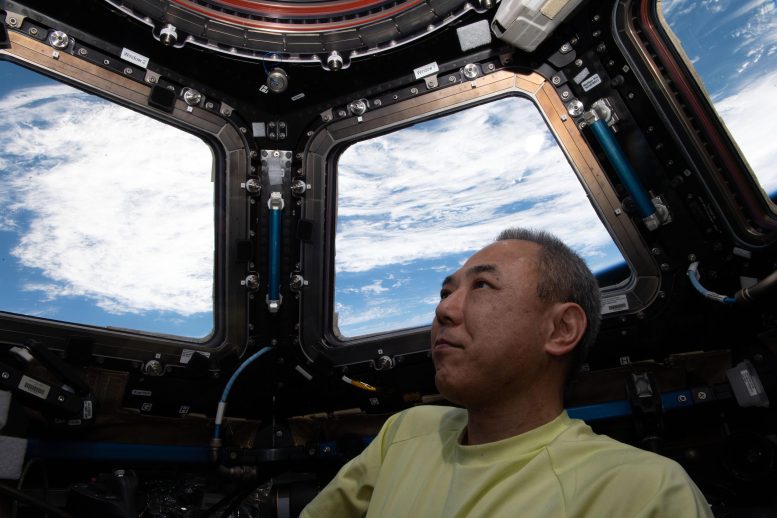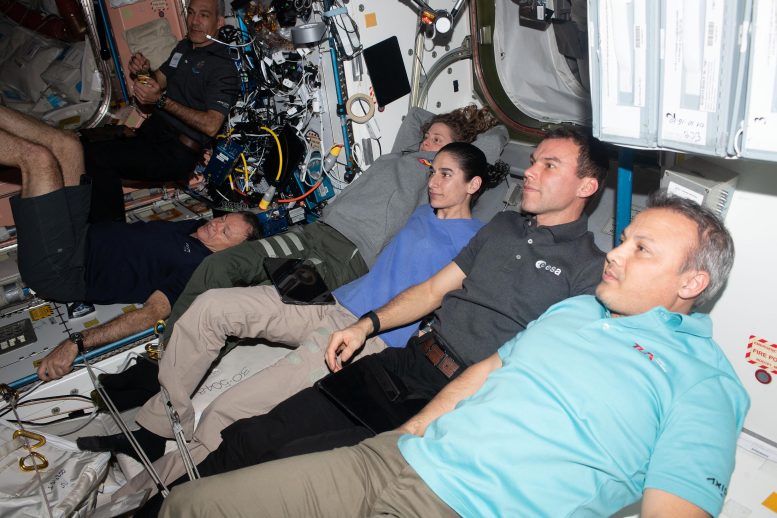The ISS Progress 81 resupply ship from Roscosmos is pictured 266 miles above the Pacific Ocean off the coast of the Kuril Islands- after undocking from the Zvezda service module’s rear port. Credit: NASA
The Expedition 70 crew is counting down to the arrival of new cargo as Progress nears its launch on Wednesday. Aboard the International Space Station, scientific hardware replacements and cargo audits topped the schedule for the seven orbital residents.
The Progress 87 cargo craft launched from the Baikonur Cosmodrome in Kazakhstan at 10:25 p.m. EST on Wednesday, February 14. Loaded with nearly three tons of food, fuel, and supplies, Progress will dock to the station around 1:12 a.m. on Saturday, February 17, where it will remain for approximately six months.

JAXA (Japan Aerospace Exploration Agency) astronaut and Expedition 70 Flight Engineer Satoshi Furukawa peers at the Earth from inside the International Space Station’s “window to the world,” also known as the cupola. The orbital lab was soaring 274 miles above the south Atlantic Ocean at the time of this photograph. Credit: NASA
In the Kibo Laboratory, Flight Engineer Satoshi Furukawa of JAXA (Japan Aerospace Exploration Agency) spent the day working on the Electrostatic Levitation Furnace (ELF). ELF allows safe thermophysical research in microgravity, providing scientists and engineers the opportunity to observe what happens to materials exposed to high temperatures in the space environment. With assistance from Flight Engineer Loral O’Hara of NASA, Furukawa retrieved ELF, and then replaced sensor controllers on the device before reinstalling it.
O’Hara completed some orbital plumbing tasks in the morning, and after assisting Furukawa, she swapped the sleeves in the Life Sciences Glovebox, which is a sealed work area astronauts use to conduct various life sciences and technology investigations.

Members of the Axiom Mission 3 (Ax-3) and Expedition 70 crews join each other for movie night inside the International Space Station’s Harmony module. From left are, Ax-3 Pilot Walter Villadei; Ax-3 Commander Michael López-Alegría; Expedition 70 Flight Engineers Loral O’Hara and Jasmin Moghbeli, both from NASA; and Ax-3 Mission Specialists Marcus Wandt and Alper Gezeravcı. Credit: SciTechDaily.com
In the Destiny module, Commander Andreas Mogensen of ESA (European Space Agency) installed new sample cartridges in the Materials Science Laboratory, a payload used for materials research in microgravity. Afterward, Mogensen collected water samples from the station’s Potable Water Dispenser, before completing a VR for Exercise and VR Mental Care session.
As part of ongoing science, crew members study burning in microgravity to determine how material flammability is affected by fuel temperatures through an experiment called SoFIE-GEL. In the morning, Flight Engineer Jasmin Moghbeli of NASA replaced experiment samples for the investigation. She then moved on to cargo ops, unloading supplies and science that were delivered aboard Northrop Grumman’s 20th commercial resupply mission.
In the Roscosmos segment, the trio of cosmonauts—Oleg Kononenko, Nikolai Chub, and Konstantin Borisov—kept busy with inventory and cargo audits throughout the day. Borisov also ran a Pilot-T session, an ongoing experiment that allows crew members to practice piloting techniques.





